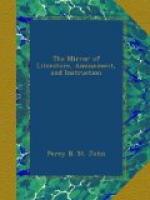Among the dead bodyes all lifelesse he
laye,
Till evening drewe on of the following
daye,
When by a yong ladye discover’d
was hee—
And this was thy mother, my prettye Bessee!
A baron’s faire daughter stept forth
in the nighte,
To search for her father, who fell in
the fight,
And seeing yong Montfort, where gasping
he laye,
Was moved with pitye, and broughte him
awaye.
In secrette she nurst him, and swaged
his paine,
While he throughe the realme was beleev’d
to be slaine:
At lengthe his faire bride she consented
to bee,
And made him glad father of prettye Bessee.
And nowe, lest oure foes our lives sholde
betraye
We clothed ourselves in beggars’
arraye;
Her jewells shee solde, and hither came
wee—
All our comfort and care was our prettye
Bessee.
And here have wee lived in fortunes despite,
Thoughe poore, yet contented with humble
delighte;
Full forty winters thus have I beene
A silly blind beggar of Bednall-greene.
And here, noble lordes, is ended the song
Of one that once to your owne ranke did
belong:
And thus have you learned a secrette from
mee,
That ne’er had beene knowne but
for prettye Bessee.
[1] Vide Percy’s “Reliques,” vol. ii. p. 178.
At Bethnal-Green is an old mansion, which, in the survey of 1703, was called Bethnal-Green-House, and which the inhabitants, with their usual love of traditionary lore, assign as the “Palace of the Blind Beggar.” This house was erected in the reign of Queen Elizabeth, by John Kirby, citizen of London, and was, says Stow,[1] “lofty like a castle.” It was afterwards the residence of Sir Hugh Platt, Knight, the author of many ingenious works; from him it came into the possession of Sir William Ryder, Knight, who died there in 1669; of late years it has been used as a private madhouse. The tradition of the beggar is still preserved on the sign-posts of several of the public-houses in the neighbourhood.
[1] Strype’s Stowe, vol. ii. p. 47, edit. 1755.
S.I.B.
* * * * *
HISTORY AND ANTIQUITY OF WILLS.
(For the Mirror.)
According to Blackstone, wills are of high antiquity. We find them among the ancient Hebrews; not to mention what Eusebius and others have related of Noah’s testament, made in writing, and witnessed under his seal, by which he disposed of the whole world. A more authentic instance of the early use of testaments occurs in the sacred writings, (Genesis, chap. xlviii.) in which Jacob bequeaths to his son Joseph, a portion of his inheritance, double to that of his brethren.




